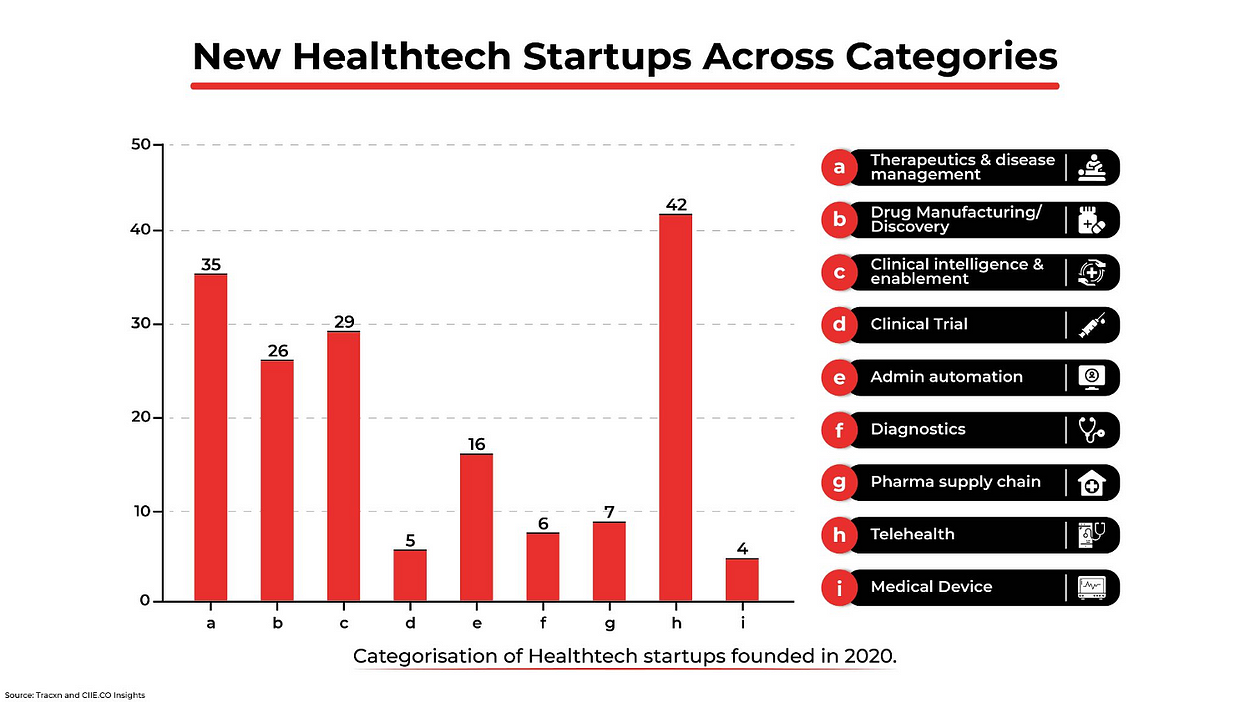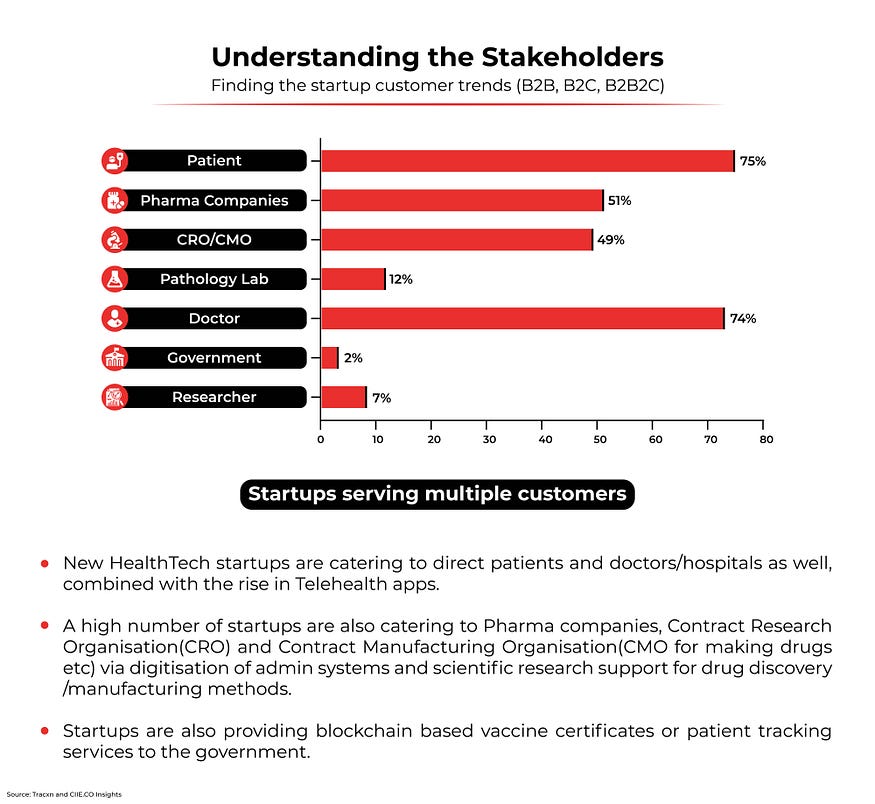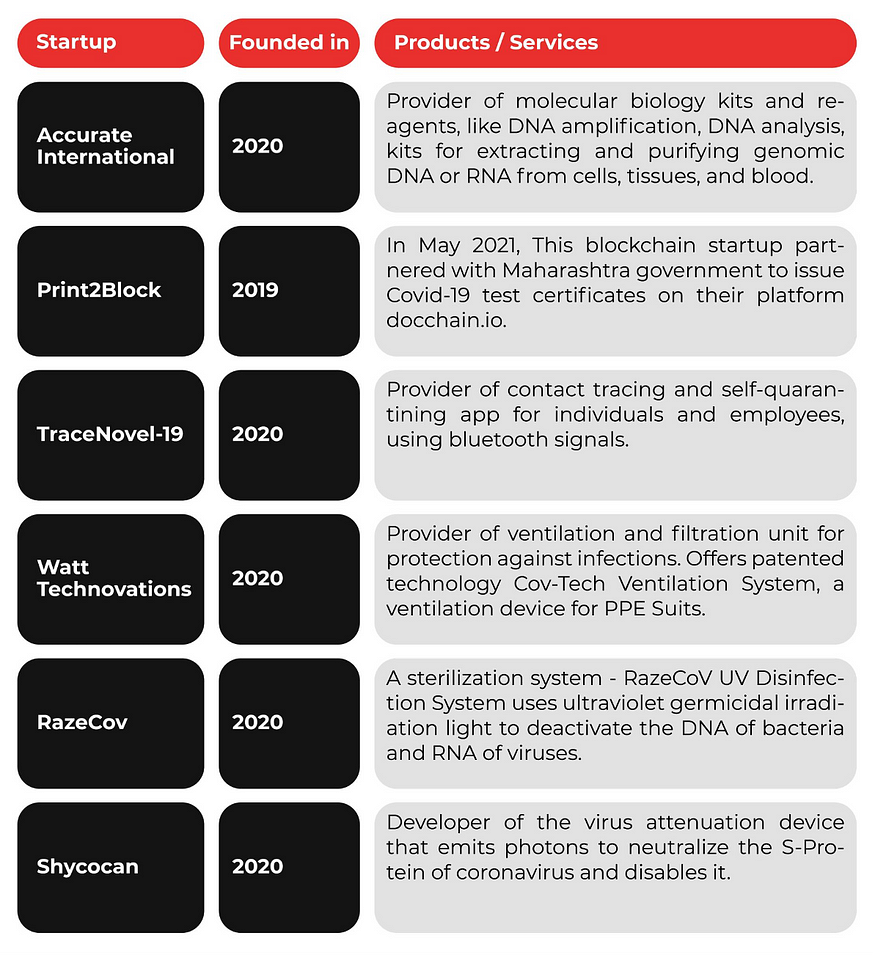How Indian Healthtech Startups are Innovating amidst the Covid-19 pandemic

Image by elenabsl on Shutterstock
The global Covid-19 crisis was not only unprecedented but it also put immense pressure on the already existing vulnerabilities and inherent gaps within the Indian healthcare ecosystem. The pandemic posed a challenge as well as an opportunity for India’s healthtech startups. The country witnessed the rise of healthtech startups in number as well as in funding; two of the recent Indian unicorns — PharmEasy and Innovaccer — are healthtech startups. The surge is here to stay and is much needed not only to combat Covid-19 but also to solve future health crises.
IIMA Ventures collected and analyzed data of 160 recently founded healthtech startups, of which 150 were founded in 2020 and 10 in 2021. The analysis has been done from three perspectives, namely — the business models, the customers, and technologies used.
Understanding the business model trends

- Highest number of startups founded in Telehealth (42 out of 160). During pandemic 30% of all patient visits were done via telemedicine and it is likely to grow more. Case in point being Practo’s journey during the pandemic, which experienced growth of 16% in online consultations on a week-on-week basis during May 2020, and also raised Series D investment. Other startups like 1mg, Pharmeasy, Mfine etc also showed high growth and attracted investor funding during the pandemic. In CIIE.CO’s recent report — Understanding Telemedicine in India: The Future of Healthtech, we discuss rapid growth of teleconsultations, ePharmacy, eDiagnostics and remote monitoring to name a few potential segments for startups.
- A new category of Covid-19 products/services comprises 11% (23 startups): These are the startups working indirectly or directly for the frontline workers and vaccination of Indian population. startups are working on data management, Covid-19 progression monitoring solutions, pandemic responses care, social distancing using bluetooth/IoT, patient tracing, remote monitoring, N-95 mask/PPE maker, sterilisation tools/services, manufacturer of vaccine equipment, IoT devices based at home diagnostics, Covid-19 rapid test kit, supply chain management, AI/ML data driven clinical trials and many more.
- Even with nationwide vaccine drives for Covid-19, there are not many new startups working for clinical trials for drugs or vaccines.
These healthtech startups are leveraging powerful technologies to create products and services that serve patients as well as other stakeholders in the healthcare ecosystem.


Looking beyond the pandemic: Healthtech trends for 2021 and beyond
Startups need to look beyond Covid-19 and build products that will be relevant even after the pandemic ceases to exist.
1: Digital surveillance to be the new normal
Telehealth and telemedicine are new standards for healthcare providers that empower them to diagnose, treat, and operate on patients without the need to be physically present. Remote patient monitoring (RPM) powered by AI can help providers to collect, monitor, and track their patients, analyze data in real time, and step in when necessary.
2: R&D to embrace new discovery and delivery models and pave the way for leaner and faster clinical trials
Faced with an immediate need for Covid-19 vaccine and treatment, the industry is being forced to push beyond traditional boundaries to accelerate. The pandemic has exposed the industry’s dependence on the patient being onsite. There will be an increase in virtual trials, which use remote monitoring, teleconferencing, and digital data collection tools to conduct trials outside of traditional clinical trial sites.
3: Shaping up of the Indian biosimilars landscape
The Covid-19 pandemic has triggered a race for pharmaceutical companies to repurpose their commercialized drugs approved for other clinical indications to treat patients suffering from this disease. A rapid development of biosimilars is another avenue to assure a consistent and affordable supply for patients in times of unprecedented increasing demand.
4: Analytics to improve vaccine distribution and administration
There is a need for agile, data-driven strategies to optimize limited vaccine supplies. Analytics can identify the location and concentration of priority populations, monitor the relative adequacy of providers capable of vaccinating critical populations, measure changes in need and demand patterns to optimize supply chain strategies and track community-based transmission and efficacy.
5: Healthcare big data
Accelerated digitisation amid the pandemic has also pushed the need to maintain electronic medical data of the patients. Digitization of healthcare data on standard-based protocols would ensure that there is standardisation and interoperability of data which can be used further for obtaining various insights and taking informed care decisions.


Some other startups include JitoCovid (Teleconsultation), GlobalMedCure (Teleconsultation), Phyto-V (Ayurvedic for Covid-19), RespiRehab (Teleconsultation-Covid-19 lung rehab), RebuildTheChain (Covid-19 employee health card), Raksh (Wereable based social distancing), QuillHash Technologies (Covid-19 Patient tracking on blockchain).
With the healthcare market in India expected to grow to INR 8.6 trillion ($133 Billion) by 2022, and increasing number of patients, providers, governments and ecosystem players adopting digital healthcare solutions, the number of startups founded, funded and building cutting edge technology in India is bound to increase. The next few months can witness many more healthtech and biotech innovations reaching the markets.
